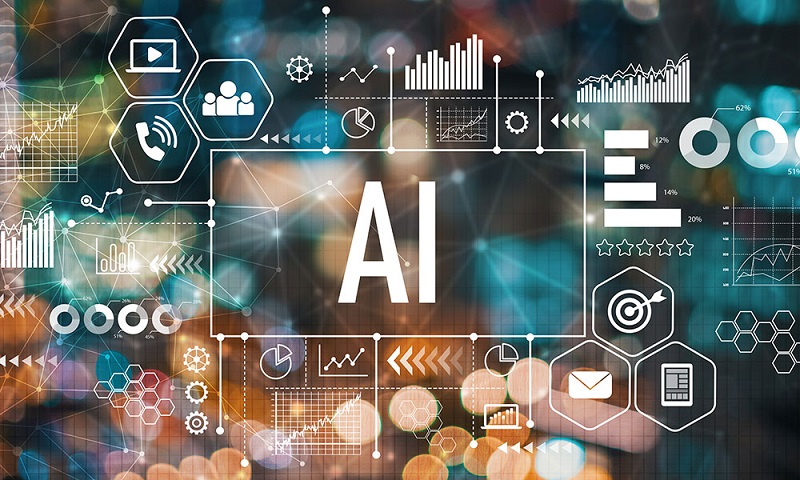Artificial intelligence (AI) has been transforming various industries around the world, and marketing is no exception. AI is changing the way businesses approach marketing by providing insights into customer behavior and preferences, automating repetitive tasks, and personalizing customer experiences. AI is enabling marketers to be more efficient and effective in their efforts, leading to increased revenue and customer satisfaction.
The fundamentals of AI in marketing include machine learning, natural language processing, and data analytics. These technologies allow businesses to analyze large amounts of data, identify patterns, and make predictions about customer behavior. By using AI, businesses can create personalized marketing campaigns that target specific customer segments, resulting in higher conversion rates and increased revenue. AI can also automate repetitive tasks such as data entry and social media management, freeing up time for marketers to focus on more strategic activities.
AI-driven marketing strategies involve leveraging AI to optimize marketing efforts. AI can be used to personalize content, optimize ad targeting, and improve customer engagement. By analyzing customer data, AI can identify the most effective marketing channels and tactics, allowing businesses to allocate resources more efficiently. AI can also help businesses make better decisions by providing real-time insights into customer behavior and preferences.
Key Takeaways
- AI is transforming the marketing industry by providing insights into customer behavior and preferences, automating repetitive tasks, and personalizing customer experiences.
- The fundamentals of AI in marketing include machine learning, natural language processing, and data analytics.
- AI-driven marketing strategies involve leveraging AI to optimize marketing efforts, personalize content, optimize ad targeting, and improve customer engagement.
Fundamentals of AI in Marketing
Artificial Intelligence (AI) has revolutionized the way businesses operate and interact with their customers. AI in marketing refers to the use of machine learning algorithms and other AI technologies to automate and optimize marketing processes. It can help businesses gain insights into customer behavior, preferences, and needs, and deliver personalized experiences that improve customer satisfaction and loyalty.
One of the fundamental aspects of AI in marketing is the ability to analyze large amounts of data quickly and accurately. AI algorithms can process and analyze data from various sources, such as social media, customer feedback, and website analytics, to identify patterns and trends. This data can be used to create targeted marketing campaigns that are more likely to resonate with customers and drive sales.
Another important aspect of AI in marketing is personalization. AI algorithms can use data from customer interactions to create personalized experiences, such as targeted product recommendations and personalized content. This can help businesses increase customer engagement and loyalty, as well as drive sales.
AI in marketing can also help businesses automate repetitive tasks, such as lead scoring and email marketing campaigns. This can free up marketers’ time to focus on more strategic tasks, such as creating engaging content and building relationships with customers.
Overall, AI in marketing has the potential to transform the way businesses interact with their customers and drive growth. By leveraging the power of AI, businesses can gain a competitive edge by delivering personalized experiences and improving customer satisfaction and loyalty.
AI-Driven Marketing Strategies
Artificial intelligence has revolutionized the way businesses approach marketing. By leveraging machine learning algorithms, marketers can now analyze vast amounts of data to gain insights into customer behavior, preferences, and needs. This has led to the development of AI-driven marketing strategies that are more effective and efficient than traditional marketing approaches.
– Personalization:
One of the main benefits of AI in marketing is the ability to personalize marketing messages and content. By analyzing customer data, AI algorithms can identify patterns and preferences that allow marketers to create highly personalized marketing campaigns. For example, a clothing retailer can use AI to analyze customer purchase history, browsing behavior, and social media activity to create personalized recommendations for each customer.
– Customer Segmentation:
AI can also help marketers segment their customers more effectively. By analyzing customer data, AI algorithms can identify groups of customers that share similar characteristics and behaviors. This allows marketers to tailor their marketing messages and campaigns to specific customer segments, increasing the effectiveness of their marketing efforts. For example, a travel company can use AI to identify customers who are interested in adventure travel and create targeted campaigns that appeal to this segment.
– Content Creation:
AI can also be used to create marketing content that is more engaging and effective. By analyzing customer data, AI algorithms can identify the types of content that resonate with customers and create new content that is tailored to their preferences. For example, a beauty brand can use AI to analyze customer reviews and social media activity to identify the most popular beauty trends and create content that highlights these trends.
Overall, AI-driven marketing strategies are more effective and efficient than traditional marketing approaches. By leveraging machine learning algorithms, marketers can gain insights into customer behavior, preferences, and needs that allow them to create highly personalized marketing campaigns, segment their customers more effectively, and create marketing content that is more engaging and effective.
Data Analysis and Decision Making
Artificial intelligence has revolutionized data analysis and decision making in marketing. With the help of AI-powered tools and platforms, marketers can now analyze vast amounts of data, gain insights, and make informed decisions that drive business growth.
Predictive Analytics
One of the most significant benefits of AI in marketing is its predictive capabilities. By analyzing historical data, AI algorithms can forecast future trends and outcomes with impressive accuracy. This allows marketers to make data-driven decisions and adjust their strategies to meet changing market demands.
For instance, AI can help marketers predict which products are likely to sell well in the future, which marketing channels will yield the best results, and which customers are most likely to convert. Armed with this information, marketers can optimize their campaigns and allocate their resources more effectively.
Customer Insights
AI-powered tools can also help marketers gain deeper insights into customer behavior and preferences. By analyzing customer data from multiple sources, including social media, search engines, and customer feedback, AI algorithms can identify patterns and trends that would be difficult to spot manually.
For example, AI can help marketers understand which products customers are searching for, what features they value most, and what factors influence their buying decisions. This allows marketers to tailor their messaging and offerings to meet customer needs more effectively.
In conclusion, AI has transformed data analysis and decision making in marketing. By leveraging the power of AI-powered tools and platforms, marketers can gain valuable insights, make data-driven decisions, and drive business growth.
Challenges and Ethical Considerations
Artificial Intelligence (AI) is transforming the way businesses approach marketing. However, it also presents several challenges and ethical considerations that must be addressed.
– Privacy Concerns
One of the biggest challenges of AI in marketing is privacy. AI algorithms require vast amounts of data to function effectively, and this data often includes personal information. Companies must ensure that they are collecting data legally and transparently, and that they are protecting this data from potential breaches.
To address these concerns, companies are implementing privacy policies and data protection measures. Additionally, they are working to build trust with their customers by being transparent about the data they collect and how it is used.
– Transparency Issues
Another ethical consideration of AI in marketing is transparency. AI algorithms are often complex and difficult to understand, which can make it challenging for companies to explain how they are making decisions. This lack of transparency can be a problem if a decision made by an AI algorithm has negative consequences for a customer.
To address this issue, companies are working to make their AI algorithms more transparent and explainable. This includes providing customers with clear and concise explanations of how decisions are made and what data is being used. Additionally, companies are working to ensure that their AI algorithms are free from bias and discrimination.
In conclusion, while AI presents significant opportunities for businesses in marketing, it also presents several challenges and ethical considerations. Companies must address these concerns to ensure that they are using AI in a responsible and ethical manner.
Future of AI in Marketing
Artificial Intelligence (AI) has transformed the marketing industry in recent years, and it is only going to get bigger in the future. As AI continues to develop and evolve, it is expected to play an even more significant role in the marketing world. In this section, we will explore some of the emerging technologies and integration with IoT that will shape the future of AI in marketing.
Emerging Technologies
The emergence of new technologies such as Natural Language Processing (NLP), Machine Learning (ML), and Deep Learning (DL) has enabled AI to become more advanced and sophisticated. NLP allows AI to understand human language, while ML and DL enable AI to learn from data and make predictions. These technologies have already been used in chatbots, voice assistants, and predictive analytics, and their use is expected to grow in the future.
Another emerging technology that will have a significant impact on AI in marketing is Augmented Reality (AR). AR can enhance the customer experience by allowing them to interact with products virtually. For example, a customer can use their smartphone to see how a piece of furniture would look in their home before making a purchase. This technology can help businesses improve customer engagement and increase sales.
Integration with IoT
The integration of AI with the Internet of Things (IoT) will also play a crucial role in the future of marketing. IoT devices such as smart home appliances, wearables, and sensors generate vast amounts of data that can be used by AI to provide personalized experiences to customers. For example, a smart fridge can detect when a customer is running low on a particular item and automatically reorder it from the store.
The integration of AI with IoT can also help businesses improve their supply chain management. AI can analyze data from sensors and predict when a machine is likely to fail, allowing companies to schedule maintenance before a breakdown occurs. This can help reduce downtime and improve productivity.
In conclusion, the future of AI in marketing looks promising, with emerging technologies and integration with IoT set to play a significant role. As AI continues to evolve, it will become even more advanced and sophisticated, enabling businesses to provide personalized experiences to their customers and improve their operations.




